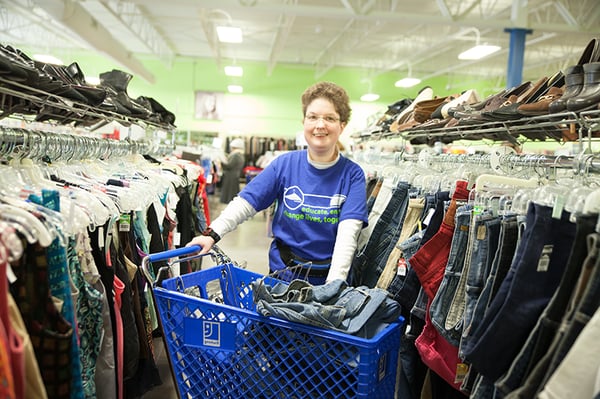July 26 marks the 28th anniversary of the Americans with Disabilities Act (ADA), a civil rights law that created protections for people with disabilities. The law comprehensively covers public accommodations, such as access to public buildings and government services, and also guarantees equal opportunity in the areas of employment, education, housing, even telecommunications and technology. People living with disabilities represent one of the largest minority populations in the U.S.
Goodwill is a longtime champion when it comes to inclusion for the nearly 50 million Americans — one out of five people — living with a disability. We advocate, create, and support opportunities both within and outside the walls of our own organization. Approximately 19% of Hoosiers experience some level of disability. Here are some thoughts on the ADA from Betsy Delgado, Vice President of Mission and Education Initiatives:
Here are some thoughts on the ADA from Betsy Delgado, Vice President of Mission and Education Initiatives:
What was life like for people living with disabilities before the ADA?
“The ADA really leveled the playing field. It afforded those with physical, intellectual or cognitive disabilities the opportunity to have fairer access to education, employment, housing, transportation and many other areas. The law is significant because all of those things make a difference in an individual’s ability to be independent — to have a productive and fulfilling life. The action word in Goodwill’s mission is ‘empowering.’ Through our many programs, including disability services, we create avenues for all people to lead independent lives and reach their highest potential. The ADA complements Goodwill’s mission across the organization.”
What are some of the myths or stereotypes about people living with disabilities?
“There are so many, but let’s just look at employment. Goodwill provides job readiness, coaching, job placement and supportive services for a significant number of people living with disabilities. One myth is that employees with disabilities miss work more often and are not as productive as employees without disabilities and that’s just not true. Studies show that employees with disabilities, on average, have better attendance than those without disabilities. They do not call in sick more often.
“Another myth is that it’s expensive for employers to provide accommodations. The majority of employees do not require any special accommodations, and, for those that do, the investment of a few hundred dollars pays off in the long run with reliable employees and less turnover. As an added incentive, businesses may qualify for tax credits and deductions from the IRS. Creating job opportunities for people with disabilities is the right thing to do, but it also makes good business sense. In business terminology, it’s a positive return on investment.”

How does the ADA benefit those who are not disabled? Why should they care?
“Looking at the economics of the ADA, it provides opportunities for those living with disabilities to become more financially independent, to support themselves and their families. This decreases the need for public assistance; that’s a tangible measurement that benefits society as a whole.
“Another area is technology. The world is increasingly becoming dependent on technology for the basic tasks of daily living — the internet is how we find most jobs, do our banking, shopping, communicate, and so forth.
“Looking at these things from the user-experience — how those who live with disabilities use products and services — is driving research in artificial intelligence, online accessibility, and product enhancements and development. That benefits everyone and something non-disabled people may not even think about. Comcast is a great example. Several years ago they updated their technology so that televisions and cable boxes could be controlled by voice recognition. This innovation benefits all customers and is the result of finding a creative solution for those with visual impairments.” 
Through numerous, time-tested employment services, Goodwill of Central & Southern Indiana helps individuals with disabilities — and those who have barriers due to lack of education, criminal history or a poor work history — reach their fullest potential. The ADA has an online toolkit for ways employers, schools and communities can celebrate and support inclusion throughout the year. Or contact the ADA National Network. It’s a free resource for ADA guidance and implementation.

